
The Republic of North Ossetia–Alania, is a republic of Russia situated in the North Caucasus of Eastern Europe. Its population according to the 2010 Census was 712,980. Its capital is the city of Vladikavkaz. The republic's native Ossetians speak Ossetic, among the only few Iranian languages spoken in Europe.

The Ossetians or Ossetes, are an Iranian ethnic group of the Caucasus Mountains, indigenous to the ethnolinguistic region known as Ossetia. They speak Ossetic, an Eastern Iranian (Alanic) language of the Indo-European language family, with most also fluent in Russian as a second language. Ossetic, a remnant of the Scytho-Sarmatian dialect group which was once spoken across the Pontic–Caspian Steppe, is one of the few Iranian languages inside Europe.

South Ossetia, officially the Republic of South Ossetia – the State of Alania, or the Tskhinvali Region, is a de facto state in the South Caucasus. It has an officially stated population of just over 53,000 people, who live in an area of 3,900 square kilometres (1,500 sq mi), south of the Russian Caucasus, with 30,000 living in the capital city, Tskhinvali. Russia, Venezuela, Nicaragua, Nauru, and Syria recognise the separatist polity of the Republic of South Ossetia. While Georgia does not control South Ossetia, the Georgian government and most members of the United Nations consider the territory part of Georgia, whose constitution designates the area as "the former autonomous district of South Ossetia", in reference to the South Ossetian Autonomous Oblast disbanded in 1990.

Eduard Dzhabeyevich Kokoyty is the former President of the partially recognized state South Ossetia. His term in office lasted just under ten years, beginning December 2001 and ending December 2011.

The Georgian–Ossetian conflict is an ethno-political conflict over Georgia's former autonomous region of South Ossetia, which evolved in 1989 and developed into a war. Despite a declared ceasefire and numerous peace efforts, the conflict remained unresolved. In August 2008, military tensions and clashes between Georgia and South Ossetian separatists erupted into the Russo-Georgian War.

The flag used by the Republic of North Ossetia–Alania and the Republic of South Ossetia is a tricolour, top to bottom white, red, and yellow. The flag is also said to represent the social structure of ancient Ossetian society, which was divided into three social groups forming an organic whole: the military aristocracy, the clergy, and ordinary people. The colours symbolise moral purity (white), martial courage (red) and wealth and prosperity (yellow). In blazons, the flag is described as Per fess Argent and Or, a fess Gules.

The South Ossetian Autonomous Oblast was an autonomous oblast of the Soviet Union created within the Georgian SSR on April 20, 1922. Its autonomy was revoked on December 11, 1990 by the Supreme Soviet of the Georgian SSR, leading to the First South Ossetian War. Currently, its territory is controlled by the breakaway Republic of South Ossetia.
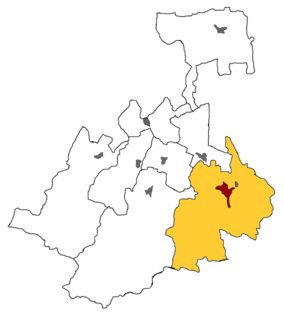
The East Prigorodny Conflict, also referred to as the Ossetian–Ingush Conflict, was an inter-ethnic conflict in the eastern part of the Prigorodny District in the Republic of North Ossetia–Alania, which started in 1989 and developed, in 1992, into a brief ethnic war between local Ingush and Ossetian paramilitary forces.

Akhalgori is a town in South Ossetia,. The name Akhalgori is the original historical name of the town used by the Georgians and officials, whereas Leningori is the name given to the city in the Soviet era and used by the South Ossetians. The town is situated on the banks of the River Ksani, height above sea level - 800 m.

South Ossetia, a mostly unrecognized republic in the South Caucasus, formerly the South Ossetian Autonomous Oblast within the Georgian Soviet Socialist Republic with its capital in Tskhinvali, held a referendum on independence on November 12, 2006.
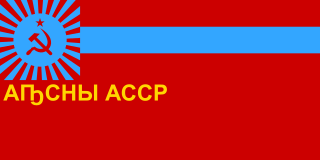
The Abkhaz Autonomous Soviet Socialist Republic, abbreviated as Abkhaz ASSR, was an autonomous republic of the Soviet Union within the Georgian SSR. It came into existence in February 1931, when the Socialist Soviet Republic of Abkhazia, originally created in March 1921, was transformed to the status of Autonomous Soviet Socialist Republic within the Georgian SSR.

The Communist Party of South Ossetia is a communist party in South Ossetia. The party was founded in 1993. As of 2004, the party claimed a membership of 1,500. The party seeks recognition of the Republic of South Ossetia, which is considered by most countries as part of Georgia
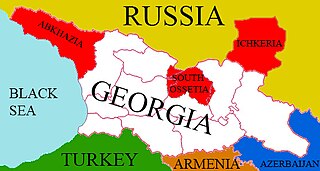
The 1991–1992 South Ossetia War was fought as part of the Georgian–Ossetian conflict between Georgian government forces and ethnic Georgian militia on one side and the forces of South Ossetia and North Ossetian volunteers who wanted South Ossetia to secede from Georgia and become an independent state on the other. The war ended with a Russian-brokered ceasefire, signed on 24 June 1992, which established a joint peacekeeping force and left South Ossetia divided between the rival authorities.
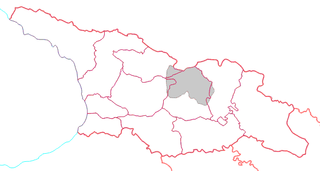
The Provisional Administration of South Ossetia is an administrative body that Georgia regards as the legal government of South Ossetia. The administration was set up by the Georgian government as a transitional measure leading to the settlement of South Ossetia's status. As of 2007, Georgia is proposing the status of autonomous republic within the Georgian state. The area mainly lies within the Shida Kartli region.

The North Ossetian Autonomous Soviet Socialist Republic was an autonomous republic of the Russian SFSR within the Soviet Union.

This article describes the background of the Russo-Georgian War.
Gerasim "Rezo" Georgievich Khugayev is an Ossetian politician aND former Prime Minister of the Republic of South Ossetia. He is the only South Ossetian Prime Minister to serve more than one time, at this date. He first served from October 1993 until May 1994 under Head of State Lyudvig Chibirov, and then again from December 2001 until August 2003, as the first Prime Minister appointed by President of South Ossetia Eduard Kokoity.
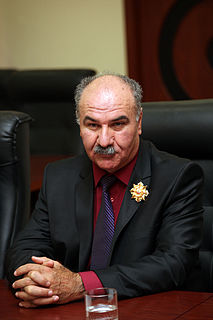
Stanislav Jakovlevich Kochiev is a South Ossetian politician, who is a former presidential candidate and former chairman (speaker) of the Parliament of South Ossetia.
The First Secretary of the North Ossetian regional branch of the Communist Party of the Soviet Union was the position of highest authority in the North Ossetian AO (1924–1936) and the North Ossetian ASSR (1936–1991) in the Russian SFSR of the Soviet Union. The position was created in November 1924, and abolished in August 1991. The First Secretary was a de facto appointed position usually by the Politburo or the General Secretary himself.
South Ossetia is an autonomous region in Georgia, approximately 1,000 metres (3,300 ft) above sea level on the slopes of the Greater Caucasus. Although it declared independence in 2008, only a few countries acknowledge it. The region is inhabited by Ossetians, an Iranian ethnic group. According to Russia, Nicaragua, Venezuela and the microstates of Tuvalu and Nauru, it is one of the world's newest independent states. All other states and international organisations consider South Ossetia an autonomous region of Georgia, functioning as a de facto state for twenty years after declaring independence and conducting a successful armed rebellion. Its Georgian inhabitants have been displaced. South Ossetia has been a source of tension for a number of years, with Georgia and Russia's political differences impeding peaceful independence and breeding a turbulent series of events which undermine the Universal Declaration of Human Rights.